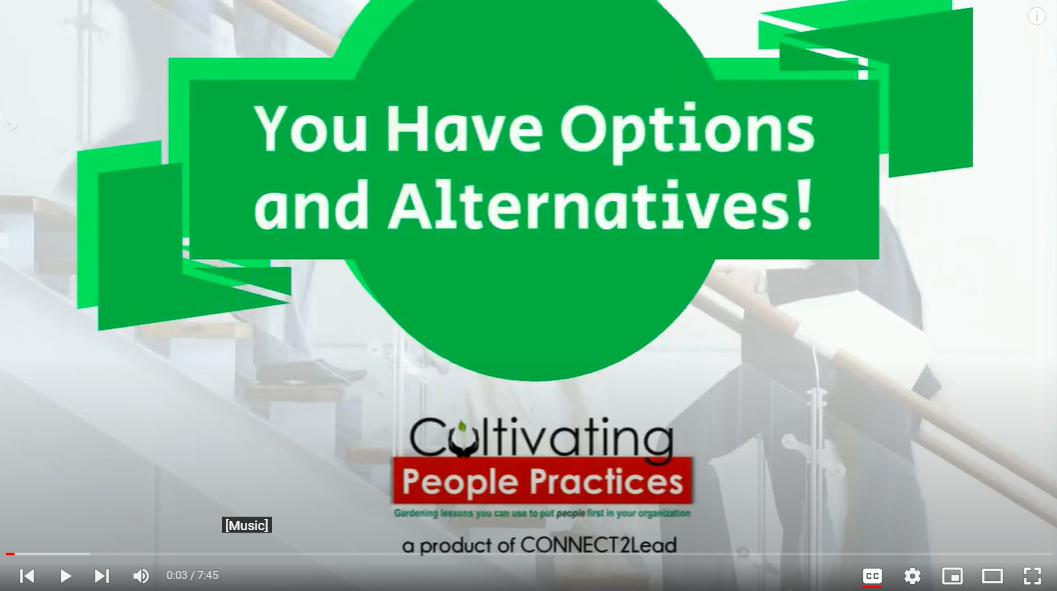You Have Options! Cultivating Flexibility
Transcript
My dad used to use a phrase that really bothered me. The phrase was, "there are many ways to skin a cat". And even as a young child, that bothered me, just the notion of that idea. I was about 19 or 20 when I met someone from Holland who used a different phrase, "There are many ways to crack a nut". And that one I thought was hilarious, but I understood what it meant. And I've always liked the idea behind both strange phrases. If you want to get something done,there will always be more than one way to accomplish what you want to achieve.
The problem is we often limit ourselves. We get very narrow in our thinking. We believe it has to be done a certain way. It's got to be done the way we do it. We don't allow for any flexibility and this becomes problematic when we're delegating work to others, because we assume that they don't know how to do it our way or if they deviate from the proven path or if they insert a little bit of their own ideas into it, that somehow it's not right.
Well, nothing could be further from the truth. And why do you care anyway? It's a matter of ego if they're not doing it your way and that upsets you. Allow space for people to try new ways. It might have an even better outcome than your way or maybe it won't. And they'll learn from that, and then they'll have more Buy-In to the way you've asked them to do things. There's nothing at all wrong with giving people some autonomy in the way they go about doing their work.
If you've set clear expectations for the outcome, for the results that you're looking for and as you've set the parameters for what's allowable and tolerable and what's not, you've got guidelines. And if you've got deadlines, so everybody knows when the work needs to be completed, that's part of the expectation. Well, then, frankly, who cares about the rest of it? Who cares if people find their own ways to get it done? When you allow for some flexibility, you allow for innovation and you allow for learning and you encourage people to become their own problem solvers. You also dignify individuals, instead of being a micromanager. Give it a try, insert a little flexibility into the way that you manage.
I'm not one to wallow, but I was really disappointed when I learned that it's virtually impossible to grow big heads of iceberg lettuce where I live, it gets too hot, too fast. And that kind of lettuce just doesn't grow here.
So I had to give up on that idea, and it turns out that there are many other varieties of lettuce that I have discovered and like even better than Iceberg. It's expanded my horizons to be forced into this situation where I can't grow what I thought I wanted. And given a choice today, I wouldn't turn back. I can barely stand it in the middle of winter when that's all that's available at the grocery store. I'd rather go without than have iceberg lettuce now.
Not only that, but it turns out all these other leafy lettuces have lots more vitamins in addition to having really great flavors. So I'm a convert, because I was willing to be flexible and not give up on lettuce entirely. I have all new kinds of lettuces in my repertoire and I enjoy them all much better than I ever enjoyed Iceberg in a salad before.
Being flexible certainly helps in gardening and probably just about anything else in life. I love tomatoes. To me, the epitome of gardening is a juicy, red, ripe tomato. I could eat them for breakfast, lunch and dinner, and sometimes I do, in the peak of summer. But in gardening, it pays to be flexible and to try new things. There are many, many other varieties of tomatoes besides the ones I grew up on, and I've embraced the idea of every year trying at least one novelty type of tomato, heirloom tomatoes especially. They're not all pretty. They're not all exactly that flavor that I'm looking for in a good BLT. But being flexible, protects me from a crop getting decimated if the conditions aren't just right, prevents me from having everything taste exactly the same and prevents me from falling into the same old, same old type of a habit.
And when you have many different varieties of tomatoes, you can make many different varieties of salsa and a tomato sauce and all kinds of other things that you might never have thought about when it comes to tomatoes. You'd be amazed at the varieties you can get in ketchups and tomato paste if you just have a mind toward giving them a try.
I grow all sorts of tomatoes, big and small, ugly, pretty, and I use every single bit of the tomato except for the stem. It goes right back into the compost pile, but the peels make a beautiful tomato powder and that tomato powder can season almost anything. I just dry it in the dehydrator and then I grind it up into powder and use it in many, many different ways.
I'd like you to metaphorically think about whatever's growing in your organization. What's growing there and how could you harvest what's growing and use it in new ways? If you were to be more flexible, what better yields could you get? What new things could you try? What outcomes might occur that you never expected? Don't limit yourself to what's always been, especially at an unprecedented time in history when so many things are changing so rapidly, being flexible has become more important than ever.

